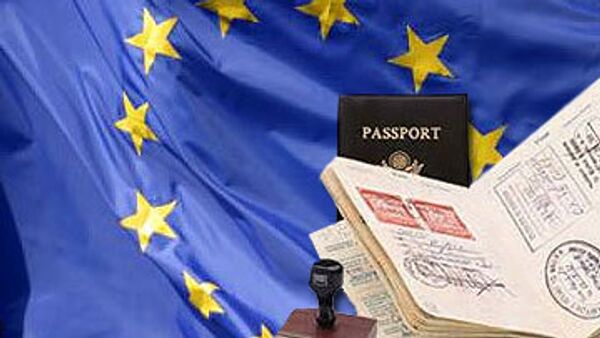The upcoming EU-Russia summit in Rostov-on-Don in southern Russia stands out for several reasons. The first of them is the extended readmission agreement, which will come into effect on June 1, the last day of this two-day summit.
Russia's representative at the EU, Vladimir Chizhov, said during a recent video- conference at RIA Novosti that from June 1 the agreement would concern not only Russian and EU citizens but also citizens of other countries. This means that if, for example, people from Kyrgyzstan, Tajikistan, Bangladesh or any other country enter Poland illegally via Russia, Polish authorities will be able to turn them over to Russia's boarder guards.
The second reason is a recent change in the EU-Russian energy dialogue. The sides are expected to reach a compromise on gas prices at the summit.
The readmission agreement is a big gift from Russia to the European Union because it makes Russia an immigration shield protecting Europe. Prior to the summit, the EU had to pay to detain and deport illegal immigrants to their home country. Now, if it is proved that an Afghan entered Europe illegally through Russia's Kaliningrad Region, for example, Russia will have to pay to transport the immigrant from Kaliningrad to the Afghan border.
Since there are no visa requirements between Russia and most other CIS countries, including revolution-torn Kyrgyzstan, this could prove extremely expensive for Russia.
What will Russia get in return? The sides have been arguing about this since Vladimir Putin formulated the goal of visa-free travel in 2002. When the EU insisted that Russia sign a readmission agreement, the Kremlin responded that the EU must first agree to permit Russians to travel to EU countries without a visa.
Negotiations stalled for four years. Russia finally broke the impasse by showing more flexibility than the EU. The readmission agreement signed in 2006 concerned only Russian and EU citizens. There were few illegal Russian immigrants to be deported from the EU, and so the EU declared Russia a low immigration threat.
"There were no more questions for Russia," said Olga Potyomkina, the head of the European integration department at the Institute of Europe, which is part of the Russian Academy of Sciences. "However, the EU demanded that we cancel foreigners' registration. I don't think we should comply with this demand. At least ten EU countries with an illegal immigration problem have registration procedures for foreigners, and besides, Russia is unlikely to secure visa-free travel for its citizens in the EU no matter how hard it tries."
In other words, the political obstacles to visa-free travel between Russia and the EU are rooted in European fears, not actual threats. Chizhov said that the point is not for Russians to automatically get work permits in all EU countries, like Poles, Romanians and several other new EU members. The point is for Russians to be able to reside in the EU without a visa for three months in a six-month period.
"The EU allows citizens of over 50 countries to do this, including countries with much weaker ties to the EU than Russia has," Chizhov said. "The EU's inconsistency is really astounding."
Indeed, if Russians will not put pressure on the EU labor market and do not pose an immigration threat, fear is the only explanation for the EU's unwillingness to grant Russians visa-free travel. "That fear dates back to the early 1990s, when Europe thought it would be swamped by refugees from the east," Chizhov said. "They got their wave of immigrants - but from the south, not the east."
Following Russia's concession on readmission, the EU has agreed to relax the visa requirements for some Russian citizens. This is certainly better than nothing. However, discriminating against certain Russians violates core EU principles. Moreover, an unwieldy visa system is not in the interests of Spain and Italy, among others, whose tourism industries have been saved by Russian tourists during this protracted recession.
Europe's second fear is their growing dependence on Russia for energy. As a result of recent energy shortages caused by transit disputes with Ukraine's "Orange" government, Europe has taken to accusing Russia of being an unreliable supplier.
But is the EU a reliable customer? During the Berlin conference, "The EU-Russia Energy Dialogue: The Gas Aspect," organized by the Russian Gas Society, Germany's E.On Ruhrgas and France's GDF Suez asked Gazprom to review the terms of their long-term gas supply contracts.
They said that gas demand plummeted during the recession and it has become unprofitable for them to buy gas at the prices stipulated in the long-term contracts.
For better or worse, price fluctuations are part of the market economy. But it's easy to imagine how the Europeans would protest if Gazprom were to ask the same of its Western partners. You can almost hear them railing against the "Russian gas noose," the unreliability of the state-controlled gas monopoly, and even the revival of Russia's "imperial ambitions."
But Russia is used to these double standards by now, and so at the upcoming EU-Russia summit, Russia will do what it always does - seek a compromise.
MOSCOW (RIA Novosti commentator Dmitry Babich)
The opinions expressed in this article are the author's and do not necessarily represent those of RIA Novosti.



